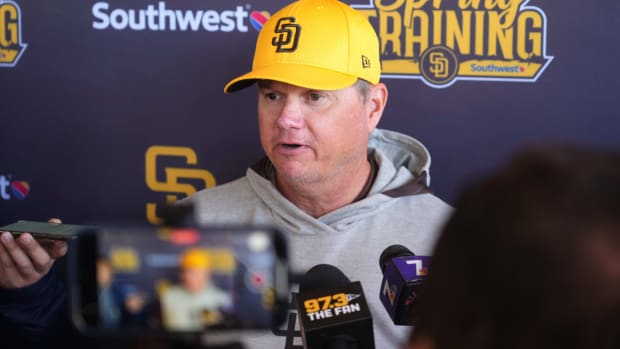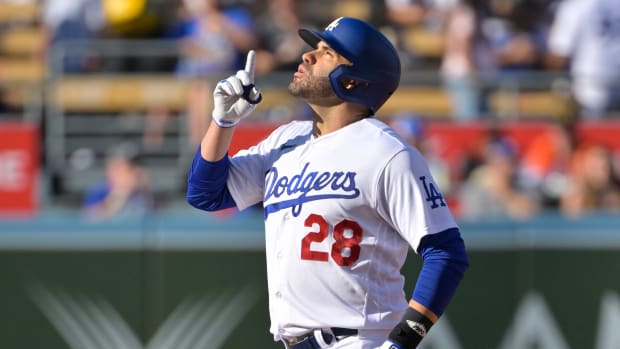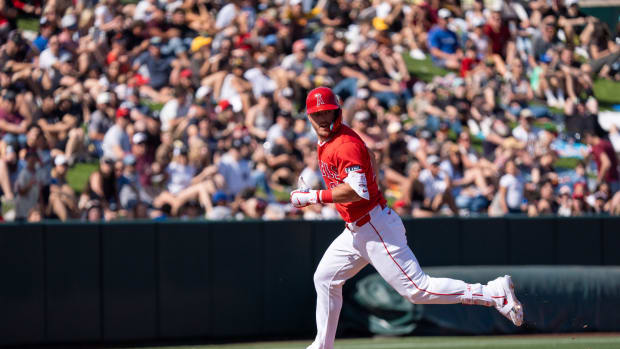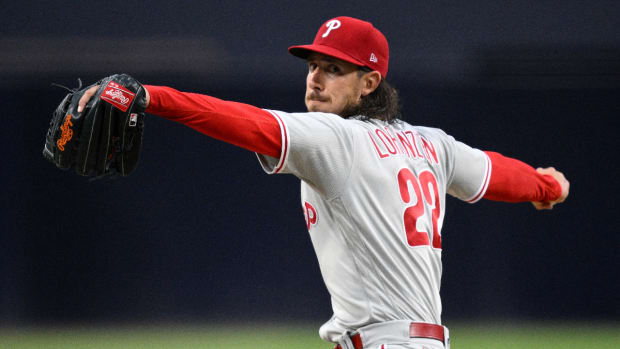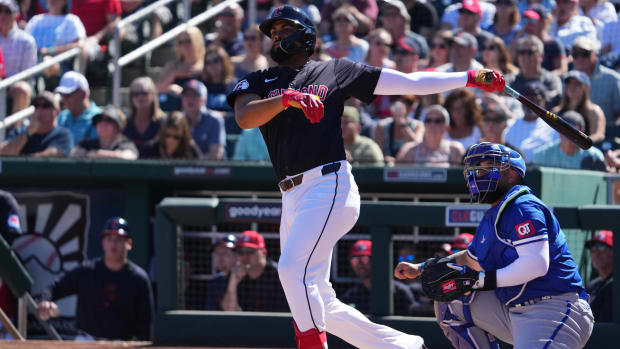Harper, Trout diverge again as one struggles and one chases an MVP award
Like Mickey Mantle and Willie Mays, who burst upon the major league scene in 1951 and even today are inextricably linked with their relative excellence hotly debated, Bryce Harper and Mike Trout appear fated to remain joined at the hip. They arrived at nearly the same time—Harper debuted on April 29, 2012, the same day that Trout was promoted for good after getting a cup of coffee in '11—and began redefining the possibilities for baseball stardom at a young age, and they remain each other's top yardstick for comparison.
When Harper, the reigning NL MVP, began the 2016 season by bashing nine homers in his first 18 games, the discussion over whether he had caught up to or even overtaken Trout—who began his season sluggishly—once more reared its head. Since then, however, the paths of the two young superstars have again diverged: Harper has scuffled for most of the past four months, albeit on a team that's running away with the NL East, and Trout has put together a typically breathtaking Mike Trout season as virtually an entire franchise crumbles around him.
Harper launched the longest home run of his career on Wednesday night, a 481-foot shot at Coors Field, ending a 17-game power outage, his longest home run drought in more than two years—one interrupted by a five-game absence due to what the Nationals called a stiff neck. He hit just .179/.324/.268 in 56 plate appearances in the games between those two homers and has hit just .226/.382/.374 since that 18-game opening salvo. Overall, he's hitting .242/.386/.454 with 21 homers, a 122 OPS+ and 1.7 Wins Above Replacement.
That's not a terrible season, but even with an OPS+ that’s actually higher than in all but his 2013 and '15 seasons and a home run total that’s one away from matching the second-highest of his career, it feels like a disappointment. His performance continues to draw scrutiny not only because it's Harper, but also because it's Harper on the heels of a breakout season, one in which he hit .330/.460/.649 and led the league in on-base percentage, slugging percentage, home runs (42), OPS+ (197) and WAR (9.9) en route to being unanimously chosen as the league's MVP. Both his OPS+ and WAR were the highest marks for any player in his age-22 season since Ted Williams in 1941, the year that the Splendid Splinter hit .406.
Zach Britton for Cy Young? The case against the Orioles' closer
Harper's batting average this year is the lowest of his career by 28 points, the product of an NL-low .248 batting average on balls in play, down from a career-high .369 last year and a career mark of .333 coming into the season. Theories abound as to what's wrong. He has struggled against four-seam fastballs, hitting just .179 with a .415 slugging percentage when making contact against them this year compared to .322/.658 last year; then again, his numbers against sliders and changeups have fallen off almost as dramatically. He's grown overly selective after being pitched around earlier this season to an almost absurd degree by the Cubs, who walked him 13 times in a four-game series in May, but his rate of swinging at balls outside the strike zone is down just over one percentage point from last year (from 27.6% to 26.4%), compared to five points within the zone (from 72.5% to 67.1%).
Just before the All-Star break, Nationals hitting coach Rick Schu pointed to Harper pulling out of his swing too soon and either popping up or rolling over ground balls as the possible cause of his problems. But Harper's 0.94 ground-ball-to-fly-ball ratio is the lowest of his career, and his 40.9% ground-ball rate is two points lower than his career mark. That said, he is popping up on 10.1% of his fly balls, by far a career high.
Last week, SI's Tom Verducci reported that Harper has been playing through a right shoulder injury for the past two months, perhaps aggravated on a head-first slide. That injury, according to Verducci, has been "particularly problematic for Harper when it comes to pulling his bottom hand through his swing, the key to creating loft and power." Yet Nationals general manager Mike Rizzo quickly refuted Verducci's report, saying, "[H]e hasn’t had a right shoulder injury. He’s got a stiff neck … the report is inaccurate." Since that exchange, which took place during Harper's absence, he's returned to go 7 for 16 with four extra-base hits and seven walks, though that damage came during a three-game series at Coors bookended by a pair of games against the lowly Braves.
The good news for Harper and the Nationals is that despite his struggles, the team is 71–49, up 9 1/2 games in the NL East race and with a 99.6% chance of winning the division according to the Baseball Prospectus Playoff Odds. Trout's Angels, on the other hand, have a nearly mirror-image record at 51–70 and are now just two games ahead of the Twins for the AL's worst record. Thanks to a whole rotation's worth of injuries, they've been playing out the string since going 8–19 in June and recently lost 11 straight games for the first time in this millennium.
David Ortiz is having a farewell season like no hitter ever (except Chicken Hawks)
That hasn't entirely obscured the brilliance of Trout's season. Currently, the 24-year-old centerfielder is hitting .309/.427/.550 with 23 homers, 20 stolen bases (his highest total since 2013), a 169 OPS+ (matching his career rate) and 7.7 WAR. That last figure leads the AL—the fifth straight season he's done that—as does his on-base percentage and his 84 walks.
For as typical as Trout's season looks, he's shown signs of growth. Though he remains vulnerable to pitches in the upper third of the strike zone, he's cut his strikeout rate to 20% this year, down from 24.7% in 2014–15. As FanGraphs' Jeff Sullivan pointed out recently, he's pouncing on more first pitches and also improved his two-strike approach. His 14 hits on first pitches this season are already a career high, more than the last two years put together, and when he connects with those, he's crushing at a .560/.556/1.080 clip. Meanwhile, his .243/.381/.424 showing with two strikes is a career high in the first two categories; his .805 OPS in that situation, also a career best, is 85 points above his norm. And where he wound up being punched out 44% of the time once he reached two strikes in the previous two seasons, he's cut that to 34% this year. That's helped to drive his on-base percentage to its highest point since 2013 (when he led the AL at .432), putting him on pace to edge past that season's 110 walks.
Even so, Trout appears destined to be overlooked by MVP voters once again thanks to the Angels' miserable record, because voters rarely tab players from sub-.500 teams; only Ernie Banks (1958 and ’59), Andre Dawson ('87), Cal Ripken ('91) and Alex Rodriguez (2003) have won MVPs while toiling for losers, with Dawson and Rodriguez the only ones to do so for last-place teams. Even without that handicap, the voters have proven resistant to Trout despite his annual dominance in WAR: He’s won just one MVP award, and that came in 2014, when the Halos won 98 games, and was bypassed in seasons where Los Angeles won 85 and 89 games. Depending upon whose team makes the playoffs and which player gets the hottest down the stretch, the Astros' Jose Altuve (7.1 WAR), the Red Sox' Mookie Betts (6.9), the Blue Jays' Josh Donaldson (6.3) or the Orioles' Manny Machado (5.6) all rate as more likely to win the award this year.
But the hardware—or lack of it—shouldn't obscure how special Trout is. He has already compiled 45.7 WAR in his young career and is on pace to surpass Ty Cobb (46.7) for the highest WAR of any player through his age-24 season. Even with just four full seasons and two partial ones under his belt, he's surpassed the seven-year peak WAR of the average Hall of Fame centerfielder (44.5) and owns the ninth-highest such score at the position. In other words, he's already heading toward Cooperstown.
Will Harper join him? Obviously, it's too soon to say. But given his immense talent, the odds are that if he's healthy, he'll shake out of this funk sooner or later, and the debate over which player is better will ignite once again.































